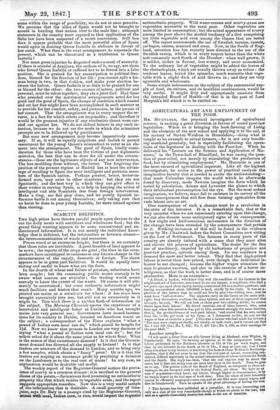SCARCITY DIETETICS.
Tan high prices have thrown careful people upon devices to eke out the daily meals with nutritious and wholesome food ; but the grand thing wanting appears to be some concentrated and au- thenticated information. It is not merely the individual know- ledge that is deficient, but the information as between classes— the intercommunication of wants and resources.
Prices stand at an enormous height, but there is no certainty that those rates are inevitable. A good breadth of land appears to be sown ; the reports of the crops are good ; the rises in the corn- markets have outstripped in suddenness any known change in the circumstances of the supply, domestic or foreign. The alarm appears to be in great part factitious. It would be equally inte- resting and useful to know what are the facts.
In the dearth of wheat and failure of potatoes, substitutes have been sought ; but the consuming public seems scarcely to be aware what sources are available; the trading world seems scarcely to know the extent of the wants. Of course it will ulti- mately be ascertained ; but some authentic information might much facilitate and hasten that result. Many months ago, we pointed out maize as a substitute fur wheat: it has since been brought extensively into use, but still not so extensively as it might be. This week there is a sudden clash of information on the subject. The Morning Chronicle quotes the experience of a benevolent and intelligent baker at Carlisle. who has brought maize into very general use; Government have issued instruct- dons for its cookery in Dublin, founded on American tracts on the subject ; a correspondent of the Times explains " what a pound of Indian corn meal can do," which pound he bought for Ifd. Now we know that persons in London are very desirous of trying " what a pound of Indian corn meal can do"; but the sellers asked for it about the same price as for wheat flour. What is the reason of that extortionate demand? Is it that the Govern- ment demand has diverted all the supply to Ireland? Is it that traders are unaware of. the demaud in London, and so bring only a few samples, which obtain a " fancy " price? Or is it that the traders are reaping an enormous profit by practising a delusion on the Londoners as to the real cost of maize? In any case, an explanation would be desirable and useful.
The weekly report of the Registrar-General notices the preva- lence of scurvy as a common disease : it is ascribed to the general disuse of the potato,—farinaceous food possessing no antiscorbutic property like that which resides in vegetable acids ; and the report suggests appropriate remedies. Now this is a very useful sample of the information that is desirable. A small quantity of lime- juice, says Dr. Baly in a pa.isage cited by the Registrar-General, mixed with meal, Indian corn, or rice, would impart the requisite
antiscorbutic property. Wild water-creases and scurvy-grass are vegetables accessible to the rural poor. Other vegetables are more limited in consumption; but the actual appearance of scurvy among the poor shows the morbid tendency of a diet comprising too little vegetable acid even among the classes that are better off. The report recommends the use of Swedish turnips, carrots, cabbages, onions, mustard and cress. Now, in the South of Eng- land, attention has but recently been directed to the use of the Swedish turnip, which is in every respect better than the white sort commonly used South of the Humber : when well grown, it is milder, richer in flavour, less watery, and more economical. To the ordinary list of vegetables might be added the leaves of the rhubarb-plant, which are usually thrown away as refuse : the tenderer leaves, boiled like spinache, much resemble that vege- table with a slight dash of acid thrown in ; and they are very agreeable and wholesome.
Some simple information on the subject of the commercial sup- ply of food, its culture, and its healthful combinations, would be very useful. It might fitly and appropriately emanate from the intended Board of Health—if that is in the part of Lord Morpeth's bill which is to be carried on.


























 Previous page
Previous page